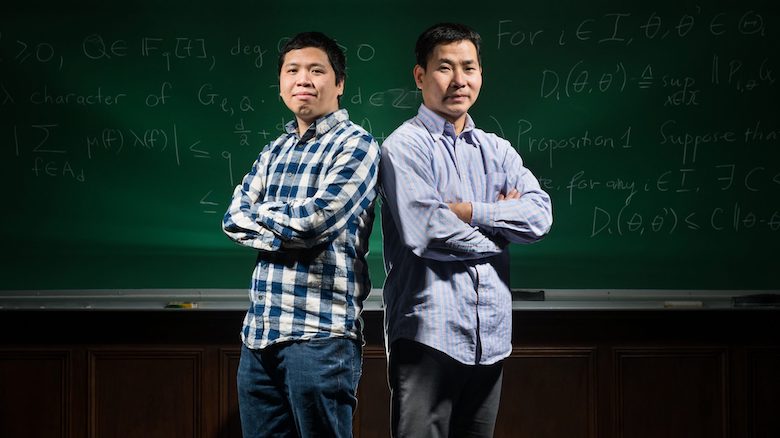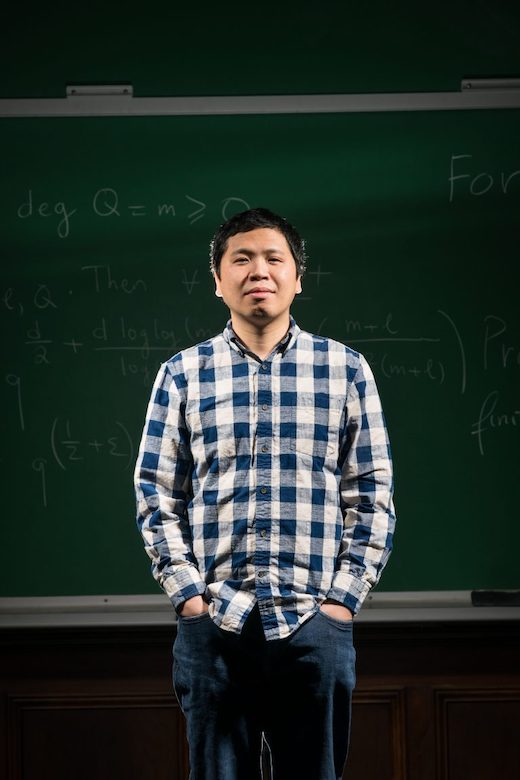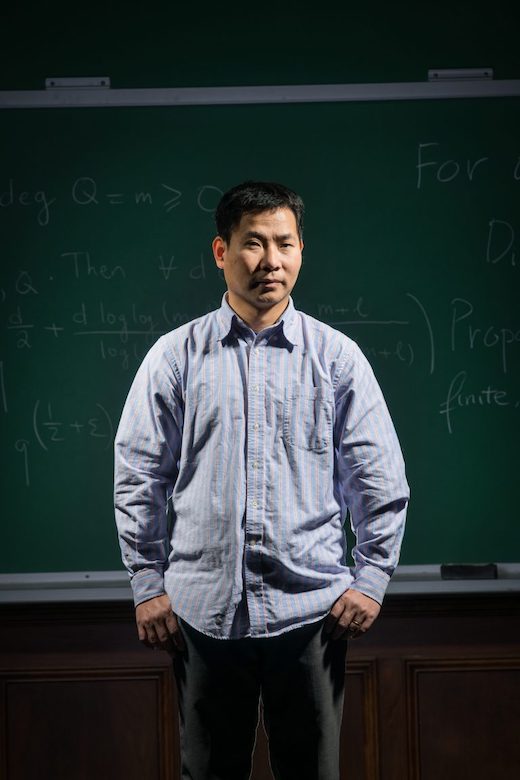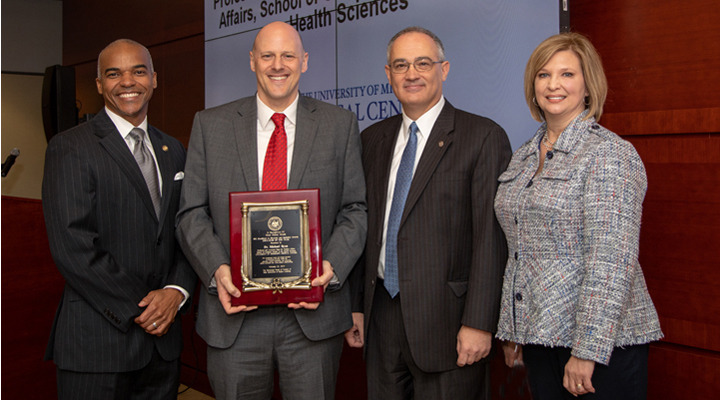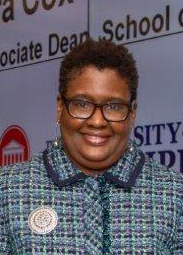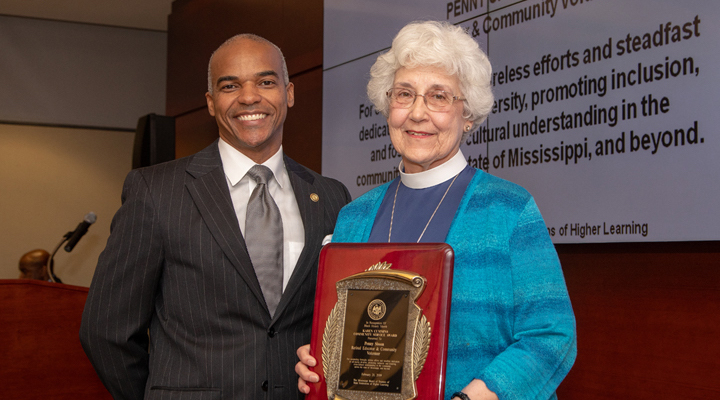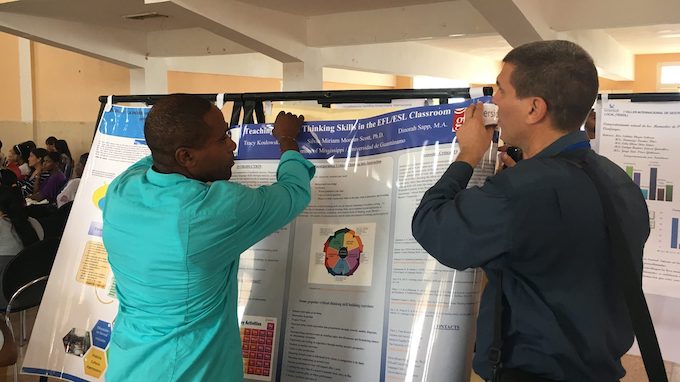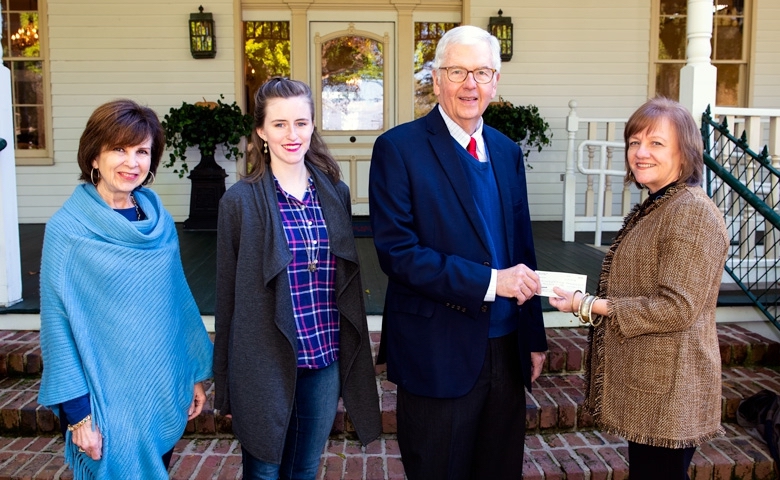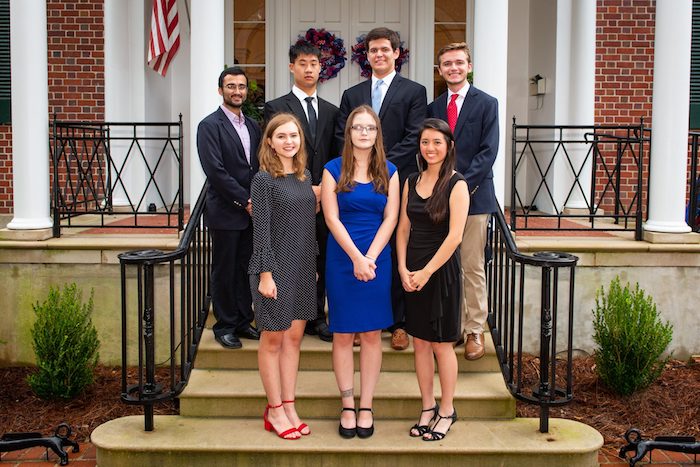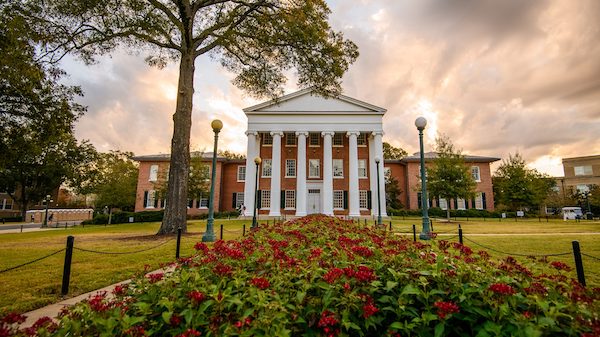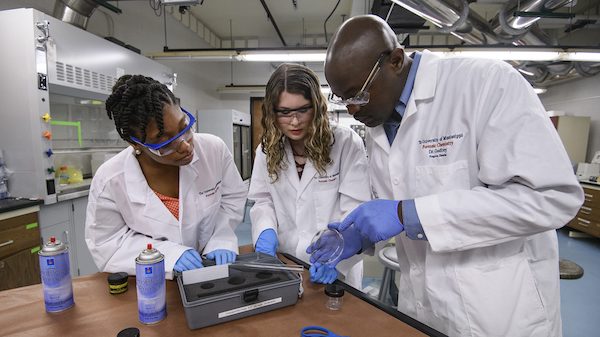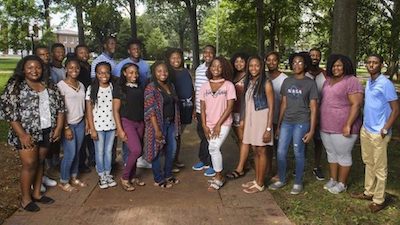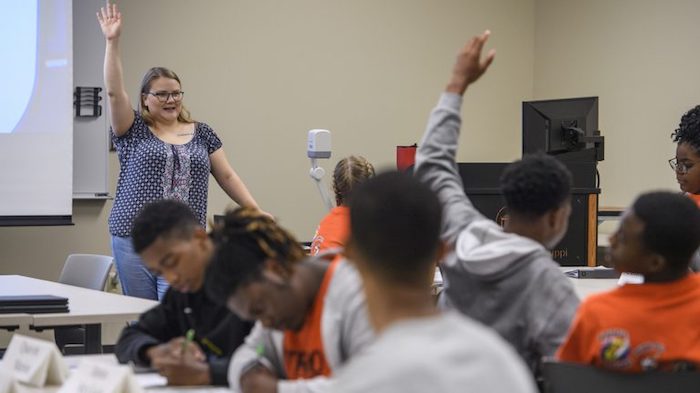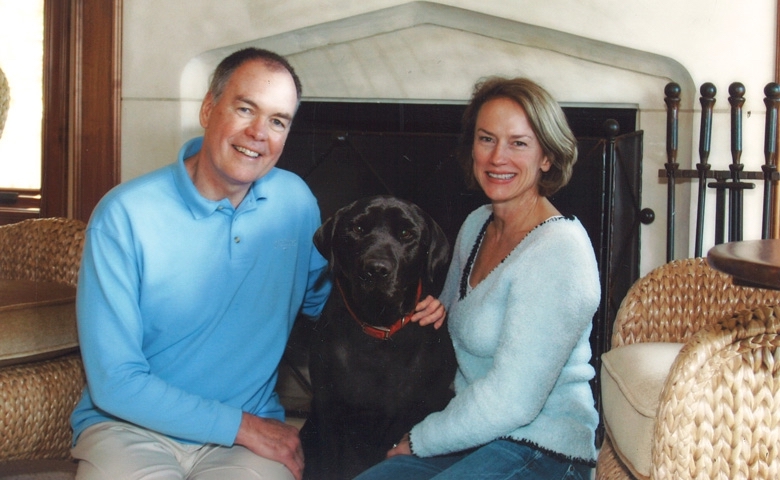Longtime mathematics professor, administrator credited with leaving lasting legacy at UM
DECEMBER 10, 2018 BY BENITA WHITEHORN
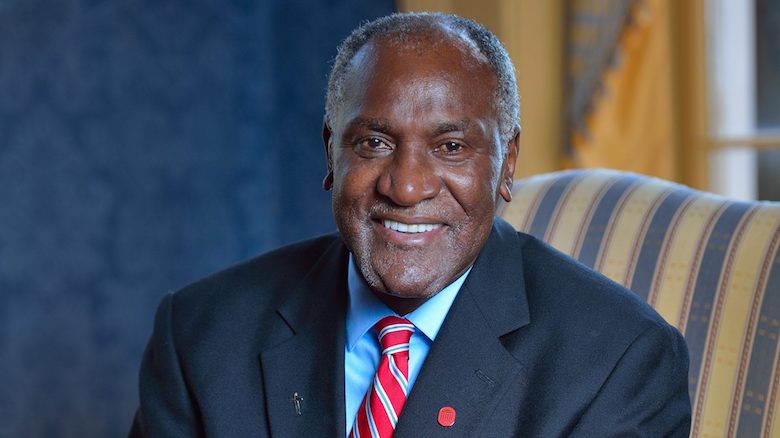
Don Cole retires from the University of Mississippi and his longtime responsibilities in the Lyceum on Jan. 15. Photo by Robert Jordan/Ole Miss Digital Imaging Services
When Donald Cole was a graduate student at the University of Mississippi in the 1980s, he and a faculty member would walk over to the Union to get coffee together. Cole would walk so fast, his companion would have to hold onto his shoulder to keep up.
As a champion of education, Cole has outpaced others ever since, but he’s retiring officially Jan. 15, and the many people who love and admire him are feeling the loss. A retirement reception will be hosted from 3 to 5 p.m. Dec. 12 in the Gertrude C. Ford Ballroom at The Inn at Ole Miss.
“He’s retiring, and it’s hitting home,” said Demetria Hereford, associate director of the Ronald E. McNair Program, who has worked with the assistant provost and associate professor of mathematics for 21 years. “Dr. Cole’s voice is one that people listen to because he’s fair to all people. People respect and appreciate fairness and compromise, thus gravitate towards him.”
The 68-year-young Cole has tried to help all students as a math professor or mentor, but he likely has done more than anyone at the university to help underrepresented students achieve academically through leading such initiatives as the Louis Stokes Mississippi Alliance for Minority Participation’s IMAGE, or Increasing Minority Access to Graduate Education, and summer Bridge STEM programs and the McNair program, which recruits 29 low-income, first-generation and underrepresented students each year and prepares them for doctoral studies.
“Dr. Cole is the most giving and kind person,” said Andie Cooper, who has worked as Cole’s executive assistant for the past three years. “His smile is contagious, and his faith is visible through his actions as he works diligently on many committees throughout campus. He truly has the heart of a servant.”
Always ready to laugh but thoughtful when he speaks, Cole reflects on the prospect of retiring after a history with the university that goes back to 1968.
“It’s going to be the people and places that I miss,” Cole said. “I’ll be coming up on weekends and looking around, so the building part I can do something about.
“Some of the people I’ll naturally run into in the community. But I’m going to miss a lot of aspects because I put my life off into it.”
Besides his roles as program director, grant writer, mentor and mathematics professor, Cole is also an administrator. Under Robert Khayat, chancellor from 1995 to 2009, he was named assistant to the chancellor for multicultural affairs.
He chaired the Chancellor’s Standing Committee on Sensitivity and Respect until last year; co-chaired the Extended Sensitivity and Respect Committee in 2013, which was initiated after a post-election incident on campus in 2012; and co-chaired the Chancellor’s Advisory Committee on History and Context the last couple of years.
Cole said he believes the university has come a long way in becoming a welcoming place for all.
“I’m always the half-full guy,” Cole said. “And so I see that the university has come a tremendous way. I remember getting here as a freshman (in 1968). I remember how uncomfortable I was, and I remember some of the incidents that made me uncomfortable. And the university’s just a far cry from that today.
“Yes, we have a long ways to go. Sometimes when we ‘fix something,’ we need to be reminded that it doesn’t stay fixed, that as new groups of students, faculty and staff come in (every year), that we have to be vigilant, we have to be conscious and not rest on any laurels. We have to cover some of the same ground, remembering that we’re covering the same ground with different people.”
Cole’s colleagues attest to the powerful effect of his presence on the university.
“From the outset, it was clear that he would be a team player but would never compromise his values and beliefs,” Khayat said. “He was loyal to the university, to his students, his colleagues and his faith.”
Provost Noel Wilkin added, “The advice and guidance that Don has provided around issues of race and diversity have been incredibly valuable. These are grounded in his steadfast pursuit of affording all students who come to our university an opportunity to be successful.”
There and Back Again
Cole grew up in Jackson, living with his parents and seven siblings, and entered Ole Miss as a freshman engineering major in 1968. He was a member of the Black Student Union, which presented the UM administration with a list of demands, asking for an end to overt racism, more opportunities for black students and staff, and the hiring of black faculty.
In 1970, Cole took part in a protest at an Up with People concert on campus and was expelled from the university along with seven other students. He spent two nights in the Oxford jail.
“Virtually every one of the 27 demands have been made a reality on this campus,” said Charles Ross, UM professor of history and director of the African American studies program, which he said exists only because of the courage Cole and others displayed as students. “Today, many individuals on our campus take for granted the opportunities that were created by the sacrifice made by Don and others.”
Kenneth Mayfield is another of the students who were expelled in 1970. He and Cole have been best friends since, and Cole even introduced him to his wife. Mayfield did not return to Ole Miss, but he persuaded his daughter, Dominique, to enroll there.
“My daughter graduated from Ole Miss (with a degree in political science),” said Mayfield, senior attorney at the Mayfield Law Firm in Tupelo. “I really wanted her to finish there because I was unable to finish there, and it would give me some sense of completion.”
Cole arranged it so that he would present his best friend’s daughter with her degree.
“It was like I finally got to graduate from there,” Mayfield said. “She’s practicing law with me now.”
After unsuccessfully trying to re-enter Ole Miss a year after their expulsion, Cole and Mayfield were accepted to Tougaloo College, where they received their bachelor’s degrees.
Mayfield went on to receive a law degree from the University of Michigan. Cole earned master’s degrees in mathematics from both the State University of New York and the University of Michigan, and returned to Ole Miss and completed a Ph.D. in mathematics in 1985.
After graduating from Ole Miss, Cole worked in Fort Worth, Texas, in the aerospace industry. He later accepted an offer to work as a mathematics professor at Florida A&M, and then was asked to join Ole Miss as assistant dean in the Graduate School and associate professor of mathematics. He returned in 1993.
So, why did Cole return to Ole Miss after being kicked out as an undergraduate?
“I’m often asked that question, and I have never been able to truly give a good answer, even to myself,” he said. “I had not truly failed at anything, and I had come here to get a degree and I had failed to get a degree.
“I had left in disgrace, left with a jail certificate, and I had come here, not by myself, but come here representing so many others, and I suspect that I had feelings about letting so many other folk down, and maybe this gave me another shot at redeeming myself, and that’s the nearest that I can answer.”
Returning to the university after the way he was treated is probably one of the biggest contributions Cole could make, said Brandi Hephner LaBanc, UM vice chancellor for student affairs.
“I feel like he truly is a role model,” Hephner LaBanc said. “He was able to forgive what happened to him, not forget.
“There have been many others he’s linked arms with, but I think he was the forerunner. He allowed us to come behind him and be brave.”
Cole has helped carry on what James Meredith accomplished when he became the first black student to enroll at Ole Miss, said Judy Meredith, a retired assistant professor at Jackson State University and wife of James Meredith.
“James Meredith opened that door, and God put Don Cole there to keep that door open,” she said.
The Merediths said Cole has always made them feel welcome during their visits to campus.
“I’ve been to Ole Miss a lot of times. Nobody has done more and better for me than Dr. Donald Cole,” James Meredith said. “I’ve never known anyone in education that I’ve had greater respect for, and I’ve known a lot of people in education who have helped me through the years.”
Teacher and Mentor
Cole has taught one math course, ranging from geometry to calculus, every semester since he’s been at Ole Miss. His interest in mathematics started in elementary school.
“I loved me some Caroline Sue,” said Cole, referencing a grade school classmate. “I devised a great scheme to get Caroline Sue to like me. She wasn’t good in math, so I took our math workbook and did the whole workbook, so that whenever Caroline Sue had a question, I had the answer right there.
“The instructor was impressed because they kind of used my book as a key. I didn’t care about that; I cared about Caroline Sue. She ended up dating my friend.”
Over the years, Cole has helped hundreds of Ole Miss students understand math, even those who thought they never could, such as Scott Coopwood, of Cleveland, Mississippi.
“I had one last class to take in order to graduate in August of ’84, and I was worried that I might not pass it because math has never been one of my strong points,” said Coopwood, founder and owner of Coopwood Communications, which includes Delta Magazine and the Delta Business Journal.
“The class was Statistics, and the first day I walked into the room I saw a young guy sitting on the edge of his desk looking through some papers, and it was Don. As everyone was pouring into the room, I walked up to him and said, ‘I’m awful at math and I’m concerned that I might not be able to pass this class, and if I don’t, I won’t graduate.’
“Don put his hand on my shoulder and in a very positive manner, he said, ‘Don’t worry, regardless of your math skills, if it comes to it, I’ll work with you after class every day, and I don’t care how long it takes. … You’re going to pass this course, and you’re going to graduate on time.’ He hadn’t known me more than two minutes.
“Don was a great teacher in every way. He went slow and explained everything extremely well. I spent a lot of time with him when I was taking that course. I can’t recall many teachers who had faith in me or in fact even encouraged me. But Don certainly did. Thirty-four years later and I have never forgotten the impact he had on my life in the summer of 1984.”
Other students sing Cole’s praises as a mentor, as well.
“As a freshman majoring in mathematics, I knew that he would be someone who could serve as a resource and mentor throughout my undergraduate tenure,” said Skylyn Irby, who met Cole during the summer before her freshman year and participated in the Bridge STEM program, which serves underrepresented incoming freshman STEM majors, and McNair program.
“He was someone who overcame the adversities that many underrepresented people of color encounter in STEM-related career fields. More specifically, he was a mathematician and someone who gave me the confidence to pursue a degree in mathematics.”
Cole has had a profound impact on undergraduate and graduate education at the university, said James Reid, UM chair and professor of mathematics.
“It was noted in that June/July 2009 issue of the Notices of the American Mathematical Society that over one-third of the African-Americans who received Ph.D.s nationally that year had graduated from this university in 2006,” Reid said. “Dr. Cole was an essential contributor to this effort and recruited and mentored many of these students. He is a remarkable member of the Ole Miss family.”
Cole, who won the university’s Frist Student Service Award in 2001 and Award for Excellence in Promoting Inclusiveness in Graduate Education in 2004, said the LSMAMP IMAGE and summer Bridge STEM programs and McNair program are dear to his heart.
“They have been pivotal programs that have absolutely changed the lives of many, many individuals who have participated,” Cole said. “They have been programs that have highlighted us as an institution far beyond our walls and borders.”
Family Man
So, with all the work Cole has done for the university, has he had time to be a caring husband and father and all-around good person? The answer is yes, said Marcia Cole, his wife of 38 years and UM lecturer of applied gerontology.
“I think he is the kindest, most patient, caring individual that I know,” she said. “He just genuinely cares about people, and he will do everything within his power and use any resource available to him to be of some help, even to his detriment.”
The Coles have three grown children: Don II, 35; Mariah, 32; and William, 31. Marcia Cole said her husband wanted to be a father from day one. He watched his children play sports and taught them how to swim and build a fire. He made sure his daughter knew how to bass fish, catch a ball, change a tire, do yardwork and fix the plumbing.
“He’s a big kid at heart,” Marcia Cole said. “At the house, if I heard something happen, I wasn’t calling the kids. I called him.”
Upon retirement, Don Cole said he’ll continue to devote time to his favorite hobby, photography, and around the house he plans to set up a couple of aquariums, garden and “fix” things. In addition, he’ll continue serving his community through work with civic and humanitarian organizations such as Habitat for Humanity and at New Hope Missionary Baptist Church.
From faculty to students to administrators, Cole’s impact at the university and across the state will be felt for generations to come.
“Cole is a selfless, supporting role model,” said Victoria Robinson, who participated in the Bridge STEM program, IMAGE and the McNair program. “Without him, I would not be as successful as I have been in my undergraduate career. I’ll miss him more than he knows.”
